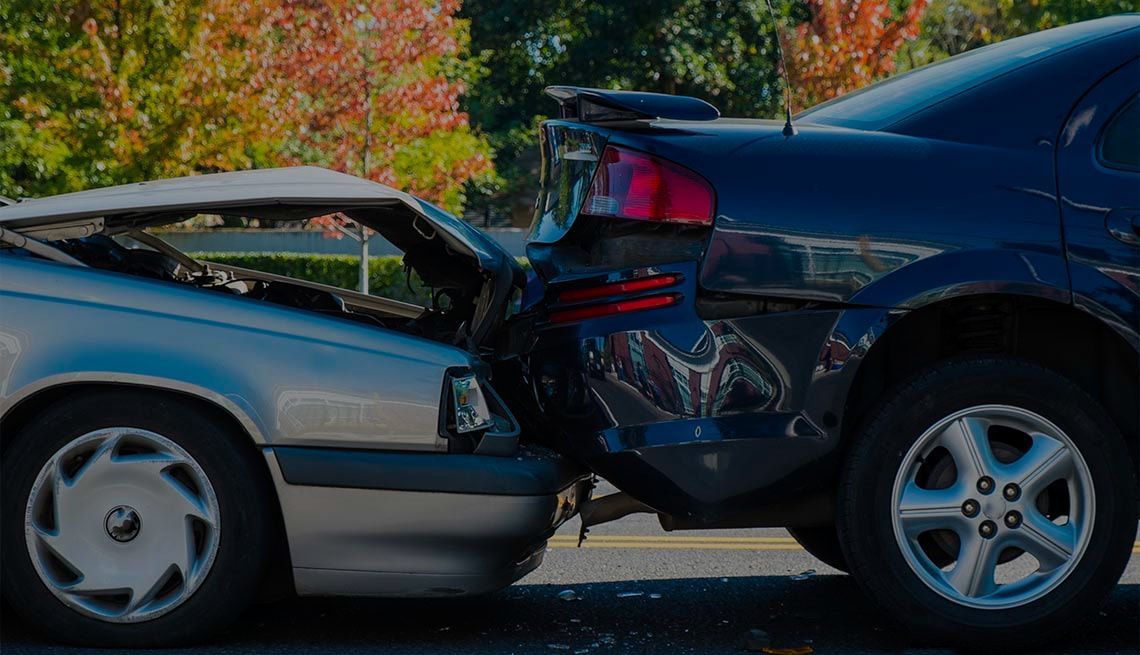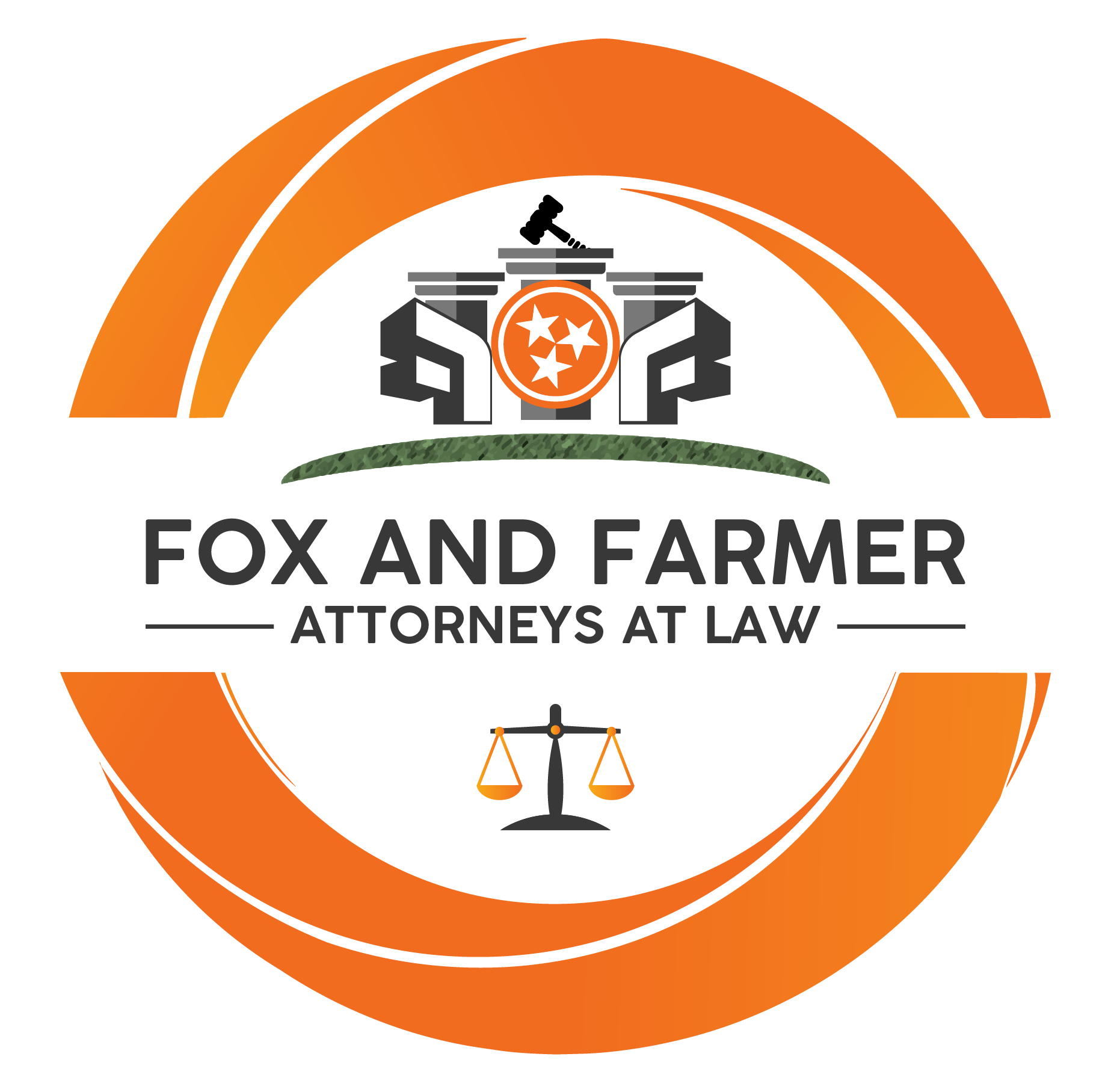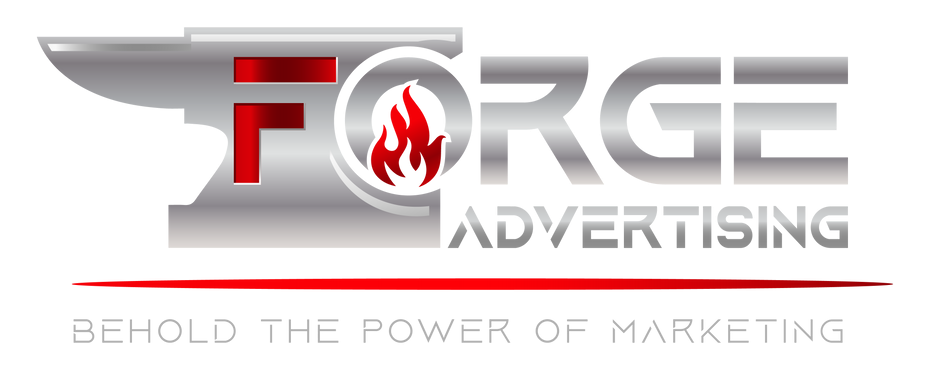Fox & Farmer Attorneys At Law
Frequently Asked Questions
Top 10 reasons to Hire a Car Wreck Attorney
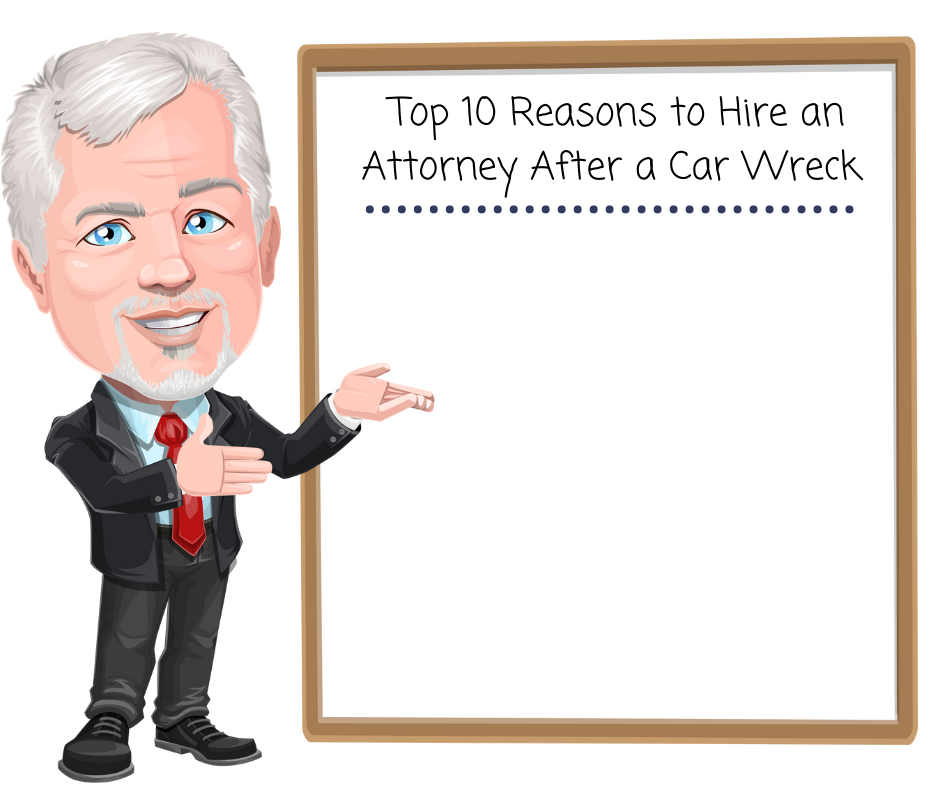
Getting into a car accident can be a traumatic experience. Car wrecks can disrupt everyday life for weeks, months, and, in extreme cases, forever. Whether minor or major, most people focus on their health and the health of their loved ones after a car accident—rightfully so! Unfortunately, many people often neglect to protect themselves legally and financially while on the road to recovery. This is why it’s vital to hire a proficient car accident attorney.
The car accident lawyer team at Fox & Farmer is comprised of skilled and compassionate personal injury attorneys in Knoxville, Chattanooga, and the Tri-Cities. Our staff is prepared to take care of all your legal needs so that you can concentrate on rest and recovery.
If you’re not sure why you need to hire a car accident attorney in Knoxville, car accident attorney in Chattanooga, or a car accident attorney in Johnson City and the Tri-Cities after a car wreck, our team has put together a list of reasons why it’s prudent to do so.
1) Having A Professional And Steadfast Advocate On Your Side
There are many parties that you’ll have to deal with following a car accident—the people on the other end of the accident, insurance companies, hospitals, medical professionals, and more. Few of them will have your best interests in mind.
2) Thorough Case Evaluations
You may have been in a few accidents or have friends that have been in a few wrecks, but that doesn’t make you an expert on how to deal with these situations.
3) Extensive Knowledge Of The Next Steps
Most people know to exchange insurance information after a car accident. Additionally, a person might not know what to do if they get into an accident with someone that doesn’t have car insurance. No matter the case, many people do not understand the proper steps to take next. They might not know the right people to contact for proper medical treatment and legal protection. Furthermore, they might not know the right things to say and not to say to those people.
Some unscrupulous insurance adjusters will try to get you to accept an unfair settlement, or a particular party might be unwilling to support your personal injury claims.
4) Comprehensive Knowledge Of Insurance Policies
Insurance policies are filled with fine print and often change with minimal notice. Being unfamiliar with your insurance policies could prevent you from collecting all the money that you’re entitled to.
5) Access To Top Medical Professionals
Just as no two car accidents are the same, no two injuries are the same. There are times when a general practitioner is capable of treating your injuries. There are other times when you’ll need to see a specialist.
6) Obtaining A Strong Letter Of Demand
One of the earliest and most important steps in filing an insurance claim is crafting a letter of demand. This document concisely outlines the circumstances of a car accident, the medical treatment that was required to treat your injuries, economic losses incurred due to the accident, and the affect the situation had on your life.
Preparing a superior letter of demand takes talent; it should be succinct enough to fit on a page or two, but detailed enough so that it presents every facet of the situation. Having an inadequate letter of demand could lead to a lower insurance settlement.
7) Maximum Convenience, Minimum Hassle
Building a strong case for an insurance claim can be arduous. Insurance adjusters will often do everything they can to make sure that their company pays you the least money possible. Doctors’ offices and hospitals can be slow to send you paperwork that’s essential to your case.
8) Insurance Companies Are Afraid Of Lawsuits
Although the majority of automobile accident situations are resolved by settlements, there are cases where they end up in court. Insurance companies have the upper hand when they’re facing off against a claimant without legal representation. They know that they have access to exponentially more resources and that person is highly unlikely to file a lawsuit. In short, they can afford to be the bully.
Having a proficient car accident attorney on your side shows the insurance companies that you mean business, that you aren’t afraid to file a lawsuit if need be, and have a staunch advocate that will ensure that you won’t be bullied.
9) You Need Lawyers That Can Win Trials
In the event that your car accident situation goes to court, you’ll need experienced trial lawyers. Our attorneys know how to convince juries and impress judges. We also understand how to build a bulletproof case, assemble the most impactful witnesses, and present the strongest closing argument possible.
Going to court is normally the last resort for car accidents, but you’ll have the highest chance of a trial ending up in your favor with a proficient car accident attorney representing you.
10) You Need Someone To Take Care Of All The Small Details
Car crash settlements can end up being very complex matters, filled with all sorts of paperwork that goes to a number of different parties. Our team has a thorough understanding of the process, including atypical situations that are especially complicated.
From dealing with insurance companies, medical professionals, communications, liens, release documents, and more, our team will handle everything the right way and with your best interests in mind. You’ll never have to worry about a lower settlement because of a missing document or a lapsed deadline. Our team will fastidiously take care of all your legal matters and handle every last detail.
Do I Have a Personal Injury Case? How to Determine if My Situation Is a Case for a Lawyer?
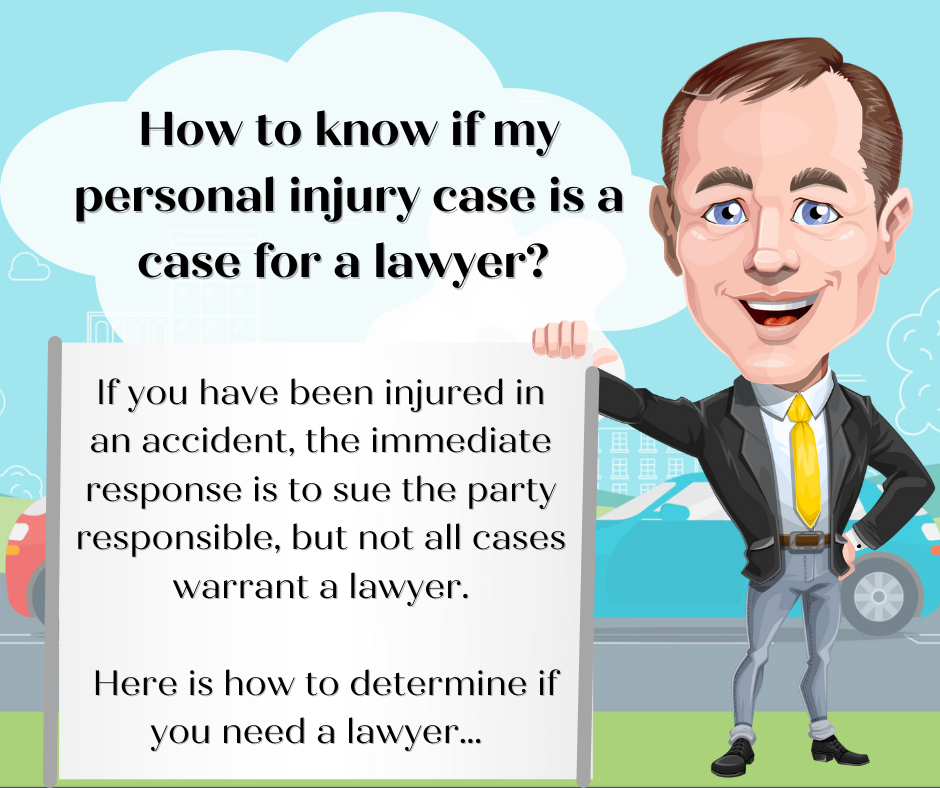
If you have been injured in an automotive accident your immediate reaction may be to sue the party responsible for your injuries. However, not all cases warrant a personal injury attorney’s involvement. Here is how you determine if you have a personal injury case in Knoxville, Chattanooga, or the Tri-Cities.
Elements
Most personal injury claims require the showing of four basic elements: 1) the defendant owed a duty to the victim; 2) the defendant breached that duty; 3) the breach proximately and legally caused the victim’s injuries; 4) the victim was damaged or harmed in some way due to this breach. Even if three out of the four elements are particularly strong, a victim might not receive compensation for the accident if the remaining element is missing. Each element must generally be proven by a preponderance of the evidence. These elements are discussed in more detail below.
A. Duty
A duty may arise in a variety of situations. For example, a driver has a duty to drive in a safe and prudent manner. In order for a victim to recover, he or she must show that the defendant had a duty to the victim. If there is no duty, there is no case.
B. Breach
Simply because an accident occurs does not mean that someone acted in a negligent manner. A person may have taken every precaution to ensure that they were driving safely and not negligently and yet they still may have been involved in an accident. This could occur if, for instance, a driver experienced an unexpected medical emergency that led to an accident. There must be some type of breach of the duty that was owed to the victim for recovery to ensue.
C. Causation
The defendant’s breach must have caused the victim’s injury; something else cannot have been the primary factor in the injury. In some cases, the breach is too far removed from the timing and circumstances surrounding the victim’s injuries for the defendant to be found to have caused the accident or the victim’s claimed injuries may have existed prior to the accident.
D. Damages
The defendant must have suffered harm in some manner. For example, he or she may have been physically injured and incurred medical expenses. His or her property may have been damaged. The victim might have suffered emotional trauma because of the accident which required treatment. In each case, the victim has to prove that the accident caused the injury for which damages are sought.
All of these elements together basically ask the question of, “Was the defendant liable for the accident?” In some situations, there is clear-cut liability. The defendant was responsible for keeping the victim safe and acted in an unsafe manner that can be easily proven. However, in other situations, liability may not be as clear. The victim may be blamed for his or her own actions that led to the accident. A third party may have shared the blame. Before an attorney agrees to take the case, he or she may want to ensure that liability can be established on the part of the defendant.
Level of Damages
Even if there is clear-cut liability in the case, an attorney may refuse to get involved in the case if there are not enough damages. A conscientious attorney will conduct a cost-benefit analysis to determine whether it is worth his or her time to take the case.
Evidence
Another factor that an experienced Knoxville personal injury lawyer, Chattanooga personal injury lawyer, or Johnson City personal injury lawyer will consider is whether there is sufficient evidence available to support your version of the event. In many cases, this is not known until the completion of the discovery process and the participants and potential witnesses have given depositions. In this case you need a knowledgeable attorney who understands how to evaluate the evidence available at the early stages of a case and decide what needs to be preserved in order for a case to have a successful outcome. For example, there might be a video of the accident if the accident occurred in a national retail chain. In such a case you need to review that video as soon as possible to see what it actually shows and to make sure it is not destroyed. Additionally, an experienced personal injury lawyer may learn that witnesses are available by reviewing the police report and will try to get statements from those witnesses to help prove your case. If you have suffered physical injuries, your medical records and bills may be used to establish damages in your case. In order to do so, this may require the attorney to take doctor’s depositions to prove the nature and extent of the injuries a victim sustained in an accident.
Top 10 Questions to Ask Before Hiring a Car Wreck Attorney
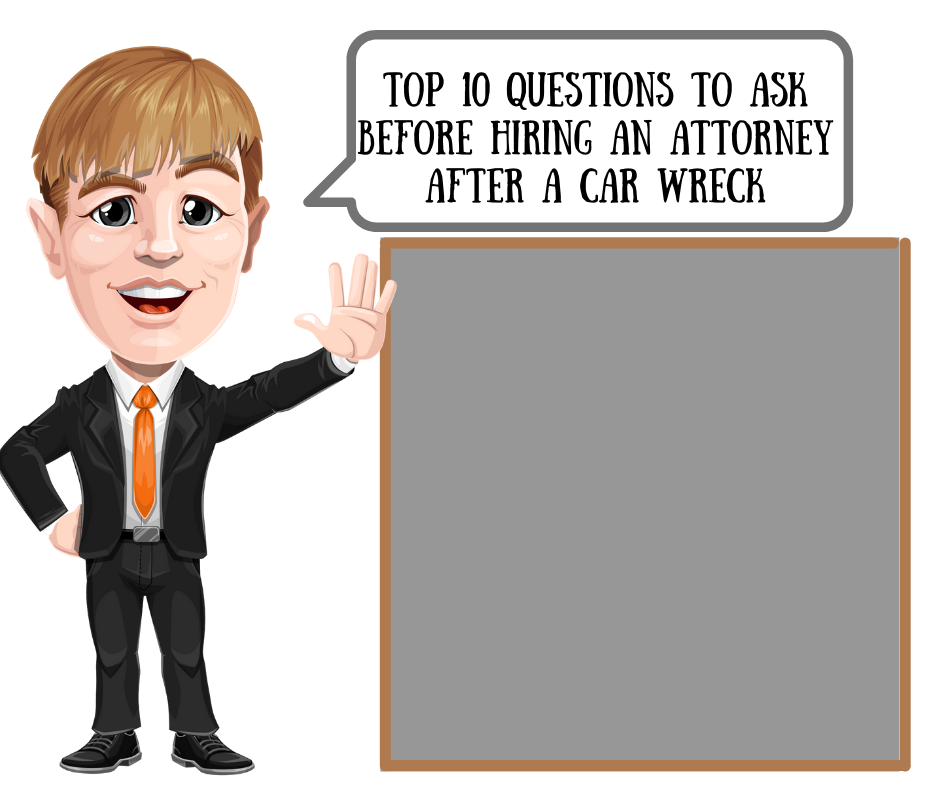
Personal injuries are a serious matter, so it only makes sense that you put in some effort when deciding who to work with for legal representation.
Indeed, it's not uncommon for accident victims to "shop around" until they find the right fit. In a sense, you want to interview your car accident attorney before committing to work with them in a professional capacity. Doing so will ensure you have a smooth experience from case evaluation to settlement award.
Trusting someone to carry your mantle of being represented in a legal battle is hardly a simple task. In fact, it is the most difficult thing you can do after enduring a personal injury collision. There’s a lot of factors to consider when a crippling event takes place, and picing the right lawyer to represent you is very important. This leads to a lot of uncertainty and doubt that can be rather overwhelming, which is why these 10 questions to ask a lawyer before hiring them to represent your personal injury case.
1) What do you specialize on?
This is the question that determines whether the lawyer you’re interviewing is going to be the right fit to represent you. Knowing your lawyer’s specialties is going to give you a great insight into their experience level, their attention to client satisfaction, and just how much effort they will invest into winning your case.
2) How many cases have you represented that are similar to mine?
This is another insightful question to ask because it will let you know just how confident the lawyer is about tackling your case. Consequently, this will let you know just how much experience and preparation they have to manage your case.
3) Who will be representing me during my case?
This is a question that must be asked because a lot of people are under the impression that the lawyer filing their case is the same one that shall represent you in court. This may not be the case for some law firms, so you must make sure to be aware of the lawyer who is actually going to be representing you in court. This tends to catch a lot of people off guard.
4) How long do you think the case is going to take?
Another question that is very important to ask a lawyer because a lot of people are under the impression that a case involving a car wreck could take very little time to solve, but that’s something only your lawyer can determine based on the nature of your case. Also, knowing how long the case is going to take can better prepare for the times ahead where it may not be able to work, or may have to go on disability.
5) How many cases like mine have you seen go to trial?
The purpose of this question is to determine whether or not the lawyer you’re interviewing has the same intentions as you do to see your case through. This is also a perfect way to find out his level of expertise when he explains to you the alternative options that are available instead of going to court.
6) Do you work on a contingency fee?
Although most lawyers work on this particular type of fee, it is best to find out whether or not this is the case for the lawyer you’re interviewing. In case, that’s not how your lawyer operates, then find out how the fees are handled as soon as possible.
7) What am I going to be doing during the case?
Your lawyer should be able to guide you through the entire process every step of the way.
8) How many cases similar to mine have you won?
Rate of success is incredibly important for when making sure a lawyer’s client has confidence entrusting their case into the law firm they’re choosing to represent them. Don’t forget to ask this question because of how you will know how efficient your lawyer really is.
9) How many cases similar to mine have you seen settle out of court?
The purpose of this question is to give yourself peace of mind in knowing that your lawyer has handled cases outside of court, and the type of outcome he has had during those past experiences.
10) How much do you think my case is going to be worth?
Of course, you want to know how much your case is worth, it is the main reason you want to be legally represented. Coincidentally, your lawyer is going to give you the best estimate possible because that’s the aim they’re looking to achieve. Remember that if you’re working with a lawyer that works on a contingency fee they won’t get paid until you win, so they’re going to make sure that the highest estimate they give is the one that you’re actually going to be awarded…if not higher.

